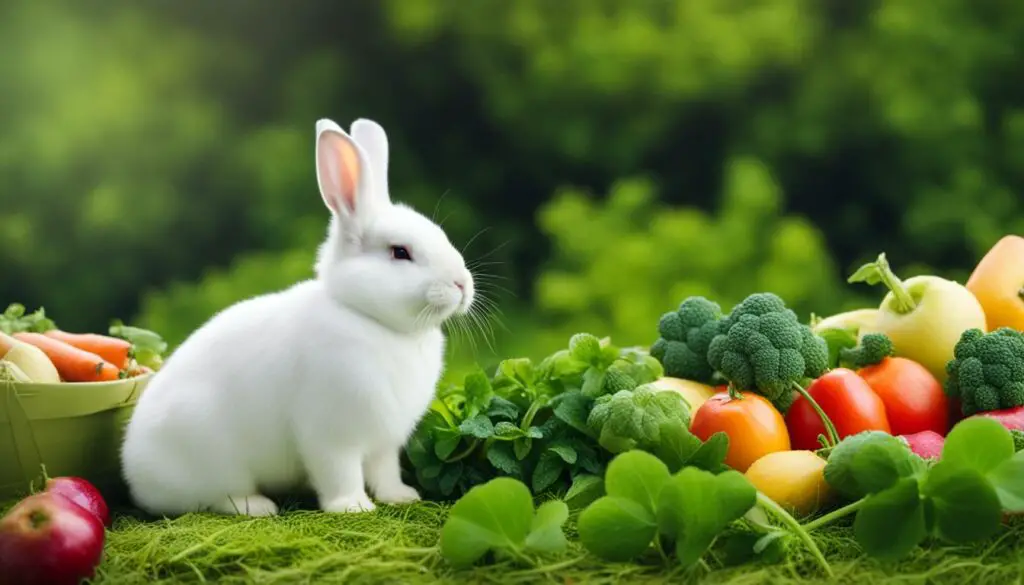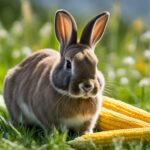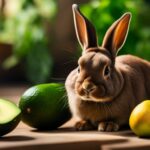As a rabbit owner, I’m always curious about what foods are safe and nutritious for my furry friend. With so many options out there, one question that often comes to mind is whether rabbits can eat clover. So, let’s dig deeper and explore the world of bunny diets.
Rabbits can indeed eat clover, including the leaves, flowers, stems, and sprouts. However, it’s important to offer it in small amounts. Feeding too much clover can lead to intestinal gas and digestive issues for our hoppy companions. That said, clover can be a delightful treat or a tasty addition to their hay for added flavor.
It’s worth mentioning that not all clover varieties are the same. There are over 300 varieties out there, including white clover, red clover, wild clover, and sweet clover, all of which rabbits can consume. But remember, diversity is key, and a rabbit’s diet should include other essential components.
Key Takeaways:
- Rabbits can eat clover, but it should be given in moderation.
- Feeding too much clover can cause digestive issues for rabbits.
- There are over 300 varieties of clover that rabbits can consume.
- It’s recommended to provide rabbits with a balanced diet that includes other foods like hay, vegetables, and pellets.
- Clover can be a nutritious treat, but it should not be the sole food in a rabbit’s diet.
Can Rabbits Eat Clover Flowers?
When it comes to rabbits’ diets, clover flowers can be a nutritious addition. These vibrant blossoms are not only visually appealing but also rich in fiber, protein, vitamins A and C, as well as calcium and phosphorus. Including clover flowers in a rabbit’s diet can provide them with essential nutrients and variety. However, it is important to remember that moderation is key.
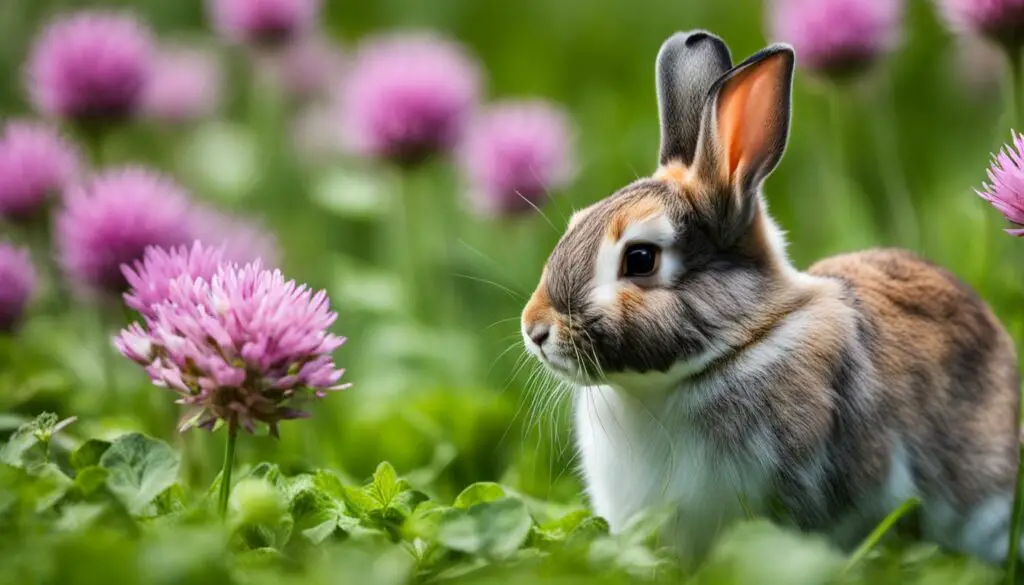
Offering clover flowers as a treat or occasional snack can be a great way to keep your bunny’s diet interesting. The nutritional value of clover flowers can contribute to your rabbit’s overall health and well-being. Just be sure to introduce new foods slowly and monitor your rabbit’s digestion to ensure they tolerate clover flowers well.
To summarize, rabbits can indeed eat clover flowers. With their fiber, protein, and vitamin-rich content, these flowers offer a nutritious and tasty addition to a well-balanced rabbit diet. Just remember to offer them in moderation and alongside other rabbit-safe foods to ensure your furry friend maintains optimal health.
Can Rabbits Eat Clover Leaves?
Yes, rabbits can eat clover leaves, and they provide several nutritional benefits for these furry friends. Clover leaves are a good source of fiber, which is essential for maintaining a healthy digestive system in rabbits. They also contain important nutrients such as vitamins A and C, protein, calcium, and phosphorus. These nutrients play a crucial role in supporting a rabbit’s overall health and well-being.
Including clover leaves in a rabbit’s diet can contribute to meeting their nutritional needs. However, it is important to remember that moderation is key. Feeding excessive amounts of clover leaves to rabbits can cause digestive issues and potentially disrupt their mineral balance. Therefore, it is recommended to offer a balanced diet that includes a variety of foods alongside clover leaves to ensure optimal nutrition.
In conclusion, while rabbits can safely consume clover leaves and benefit from their nutritional value, it is important to provide them in moderation as part of a well-balanced diet. By offering a diverse range of foods and monitoring their intake, rabbit owners can promote the health and happiness of their furry companions.
| Nutrient | Amount |
|---|---|
| Fiber | High |
| Vitamin A | Present |
| Vitamin C | Present |
| Protein | Good source |
| Calcium | Present |
| Phosphorus | Present |
Can Rabbits Eat Clover Sprouts?
Rabbits can safely eat clover sprouts as part of their diet. Clover sprouts are not only safe for rabbits but also provide them with a range of nutritional benefits. These sprouts are rich in vitamins A and C, which are crucial for a rabbit’s overall health and immune system. Additionally, clover sprouts are high in fiber and protein, promoting healthy digestion and supporting muscle development in rabbits.
When feeding your rabbit clover sprouts, it is important to introduce them gradually and in moderation. Start by offering a small amount of sprouts and observe how your rabbit reacts. If there are no adverse effects, you can continue to include clover sprouts as a nutritious treat in your rabbit’s diet. As with any new food, it’s always recommended to consult your veterinarian before making any significant changes to your rabbit’s diet.
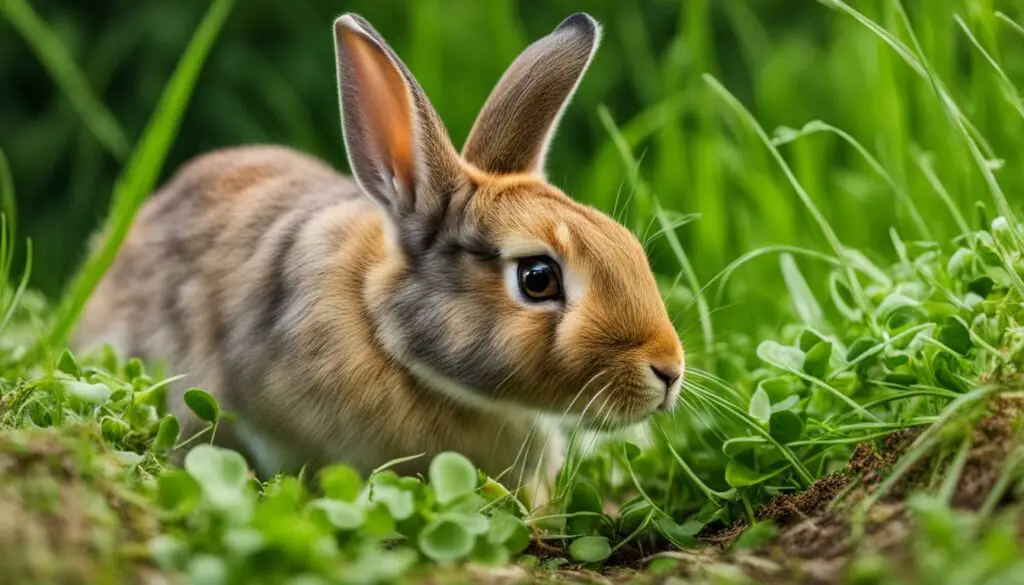
To ensure a well-balanced diet, it is crucial to provide rabbits with a variety of foods in addition to clover sprouts. This includes high-quality hay, fresh vegetables, and a small portion of pellets. These components will provide the necessary nutrients for your rabbit’s overall health and well-being. Remember to always introduce new foods gradually and monitor your rabbit’s digestion to ensure they can tolerate them well.
Is It Healthy for a Rabbit to Just Live on a Clover Diet?
A clover diet alone is not healthy for rabbits. While clover provides some nutritional benefits, rabbits require a balanced diet that includes a variety of foods. Feeding rabbits only clover can lead to digestive issues and mineral imbalances. It is important to provide rabbits with a mix of hay, vegetables, and other rabbit-safe foods to ensure their nutritional needs are met.
Rabbits have specific dietary requirements that can’t be fulfilled by clover alone. While clover contains fiber and nutrients like vitamins A and C, excessive consumption can cause digestive problems. It is vital to incorporate a diverse range of foods to promote a rabbit’s overall health and well-being.
A balanced diet for rabbits should consist of fresh grass or grass hay, such as Timothy, Oaten, or Ryegrass hays, which provide essential fiber for digestion and dental health. Vegetables like leafy greens, carrots, and bell peppers offer additional nutrients. Feeding only clover can deprive rabbits of necessary vitamins, minerals, and a sufficient amount of fiber, leading to potential health issues.
To ensure your rabbit stays healthy, it is important to introduce a variety of foods gradually. Monitor their digestion and observe any signs of discomfort or adverse reactions. By offering a well-rounded diet that includes clover in moderation, you can provide your rabbit with the nutrients they need to thrive.
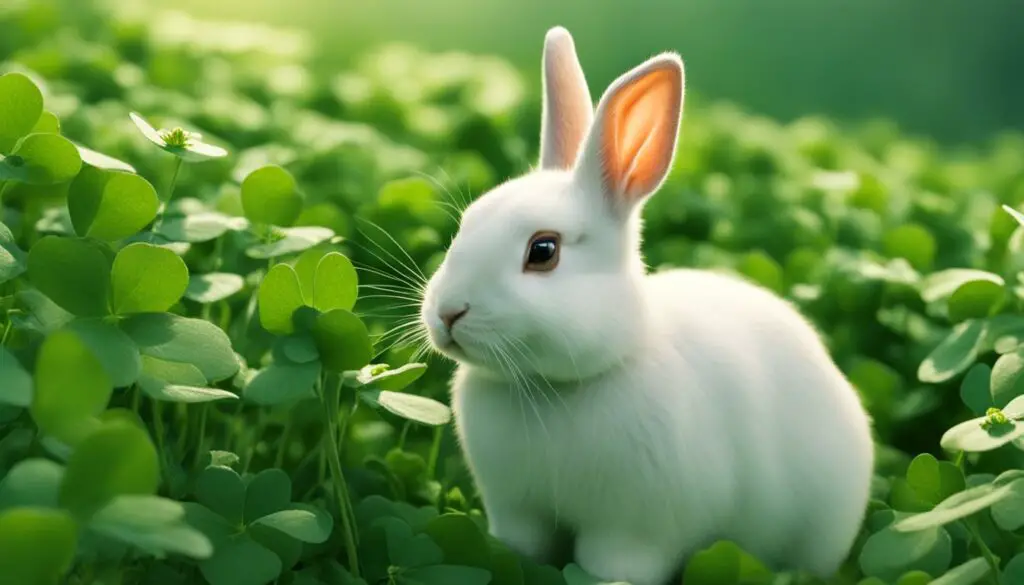
Table: Comparison of Clover and Other Rabbit-Safe Foods
| Food | Fiber Content | Nutritional Value |
|---|---|---|
| Timothy Hay | High | Rich in fiber, supports digestion and dental health |
| Leafy Greens | Moderate | Provides vitamins and minerals essential for overall health |
| Carrots | Low | Rich in vitamin A and a tasty treat for rabbits |
| Clover | Moderate | Contains some nutrients but should be fed in moderation |
As seen in the table above, while clover has moderate fiber content and provides some nutrients, it is not as beneficial as Timothy hay and leafy greens for a rabbit’s overall health. Incorporating a variety of rabbit-safe foods into their diet ensures they receive a well-rounded nutritional profile.
Clover’s Health Benefits and Drawbacks
When it comes to rabbits, clover can have both health benefits and drawbacks. On one hand, clover is a good source of fiber and nutrients like vitamins A and C. It can contribute to a rabbit’s overall health and well-being. However, it’s important to note that feeding too much clover to rabbits can lead to digestive issues and potential health risks.
“Rabbits require a balanced diet that includes a variety of foods, and clover should not be the sole food in their diet,” says Dr. Sarah Johnson, a veterinarian specializing in small animals. “Feeding rabbits excessive amounts of clover can cause intestinal gas and digestive problems.”
One of the main drawbacks of feeding rabbits clover is its high calcium content. While calcium is an essential mineral for rabbits, an excessive intake can lead to the formation of bladder stones, a painful condition that requires veterinary intervention.
“It’s important to provide a balanced diet for rabbits that includes a mix of hay, vegetables, and other rabbit-safe foods,” advises Dr. Johnson. “Offering a limited amount of clover as a treat or supplement can be beneficial, but it should not be the main component of their diet.”
To ensure a rabbit’s overall health, it’s best to introduce clover in moderation and monitor their intake. By offering a varied diet that includes fresh grass or hay, vegetables, and a limited amount of clover, rabbit owners can provide their furry friends with the necessary nutrients while minimizing the risk of digestive issues and other health problems.

| Health Benefits of Clover for Rabbits | Drawbacks of Feeding Rabbits Clover |
|---|---|
|
|
Can Rabbits Eat Clover in Any Form?
Rabbits can safely consume clover in various forms, including leaves, flowers, stems, and sprouts. Each form of clover provides slightly different nutritional benefits, but overall, they are suitable for a rabbit’s diet. However, it’s important to introduce new foods gradually, monitor their digestion, and ensure they don’t have any adverse reactions to different forms of clover.
“Feeding rabbits clover in different forms adds variety to their diet and can enhance their overall nutritional intake,” explains Dr. Emily Johnson, a veterinarian with expertise in small animal nutrition.
“Clover leaves are a good source of fiber and nutrients like vitamins A and C, while clover flowers are high in protein, calcium, and phosphorus. The stems and sprouts of clover also provide valuable nutrition to support a rabbit’s health.”
To incorporate different forms of clover into a rabbit’s diet, you can try adding a few clover leaves to their daily hay or offer clover flowers as a special treat. It’s essential to limit the amount of clover given to rabbits to prevent digestive issues. Dr. Johnson recommends referring to a rabbit’s weight and nutritional needs to determine the appropriate serving size.
| Clover Form | Nutritional Value |
|---|---|
| Clover Leaves | Good source of fiber, vitamins A and C |
| Clover Flowers | High in protein, calcium, phosphorus |
| Clover Stems | Provide additional fiber and nutrients |
| Clover Sprouts | Rich in vitamins A and C, fiber, protein |
“Remember to prioritize a balanced diet for rabbits,” advises Dr. Johnson.
“While clover is a nutritious addition, it should not be the sole food in a rabbit’s diet. Offer a variety of foods, including fresh grass or hay, vegetables, and other rabbit-safe options, to ensure their nutritional needs are met.”
By providing clover in different forms and combining it with other appropriate foods, you can enhance your rabbit’s diet and contribute to their overall health and well-being.
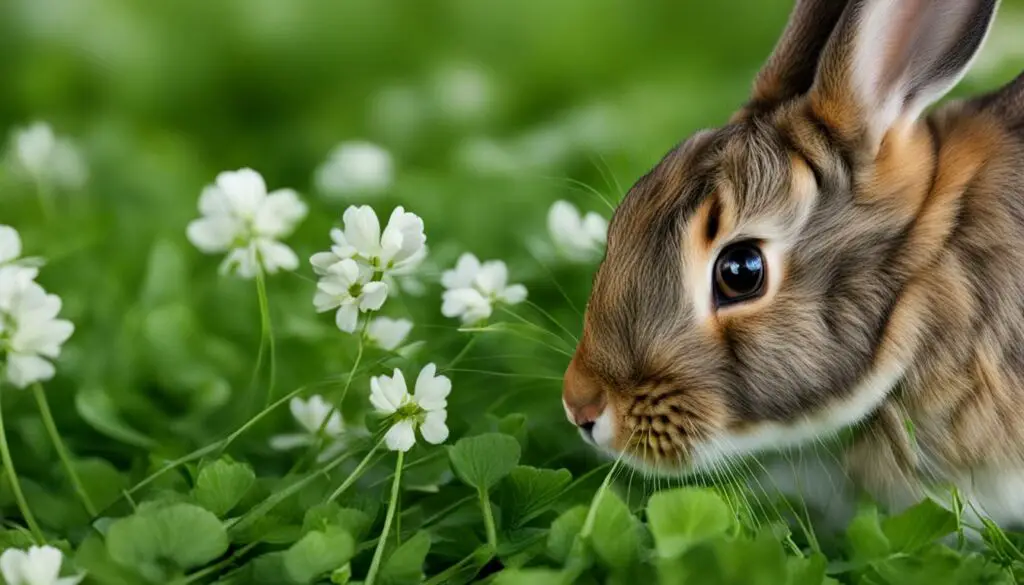
Wrap Up
In conclusion, rabbits can safely eat clover as part of a well-balanced diet. Clover, including the leaves, flowers, stems, and sprouts, provides fiber and essential nutrients such as vitamins and minerals for rabbits. However, it is important to feed clover in moderation and not make it the sole food in a rabbit’s diet.
Feeding rabbits too much clover can lead to digestive issues, so it is crucial to offer a variety of foods and monitor their intake. It is recommended to use clover as a treat or to top hay with it for added taste. Additionally, rabbits should always have access to fresh grass or grass hay like Timothy, Oaten, or Ryegrass hays to ensure proper digestive and dental health.
While clover has benefits for rabbits, such as being a good source of fiber and nutrients, it is important to be cautious. Feeding excessive amounts of clover can result in digestive problems and potential health risks, such as bladder stones due to the high calcium content. Therefore, it is crucial to balance clover with other foods to maintain a rabbit’s overall health.
In summary, including clover in a rabbit’s diet can be beneficial, but it should be done safely and in moderation. By providing a diverse range of foods and monitoring their intake, we can ensure that our furry friends receive the necessary nutrients for their well-being. Remember to introduce new foods slowly and always prioritize the availability of fresh grass or hay for optimal digestive and dental health.
FAQ
Can rabbits eat clover?
Yes, rabbits can eat clover, including the leaves, flowers, stems, and sprouts. However, it should be given in small amounts as too much clover can cause digestive issues.
What types of clover can rabbits eat?
Rabbits can eat various types of clover, including white clover, red clover, wild clover, and sweet clover.
Can baby bunnies eat clover?
Yes, baby bunnies can have a few leaves of clover. However, their diet should primarily consist of milk, water, alfalfa, and pellets until they are 12 weeks old.
Are clover flowers safe for rabbits?
Yes, rabbits can eat clover flowers. They are high in fiber, protein, vitamins, and minerals and can be enjoyed as a nutritious snack in moderation.
Can rabbits eat clover leaves?
Yes, rabbits can eat clover leaves. They provide fiber, vitamins, and minerals that are essential for a rabbit’s health.
Can rabbits eat clover sprouts?
Yes, rabbits can eat clover sprouts. They are a nutritious treat and provide vitamins, fiber, and protein.
Can rabbits survive on a clover diet alone?
No, a clover diet alone is not healthy for rabbits. They require a balanced diet that includes a variety of foods to meet their nutritional needs.
What are the health benefits of clover for rabbits?
Clover is a good source of fiber and nutrients like vitamins A and C. However, feeding too much clover can lead to digestive issues and potential health risks.
Can rabbits eat clover in any form?
Yes, rabbits can eat clover in various forms, including leaves, flowers, stems, and sprouts. Each form provides slightly different nutritional value.
How should clover be included in a rabbit’s diet?
Clover should be given as a treat or to top hay with for added taste. It should be offered in moderation and balanced with other foods to maintain a rabbit’s overall health.

